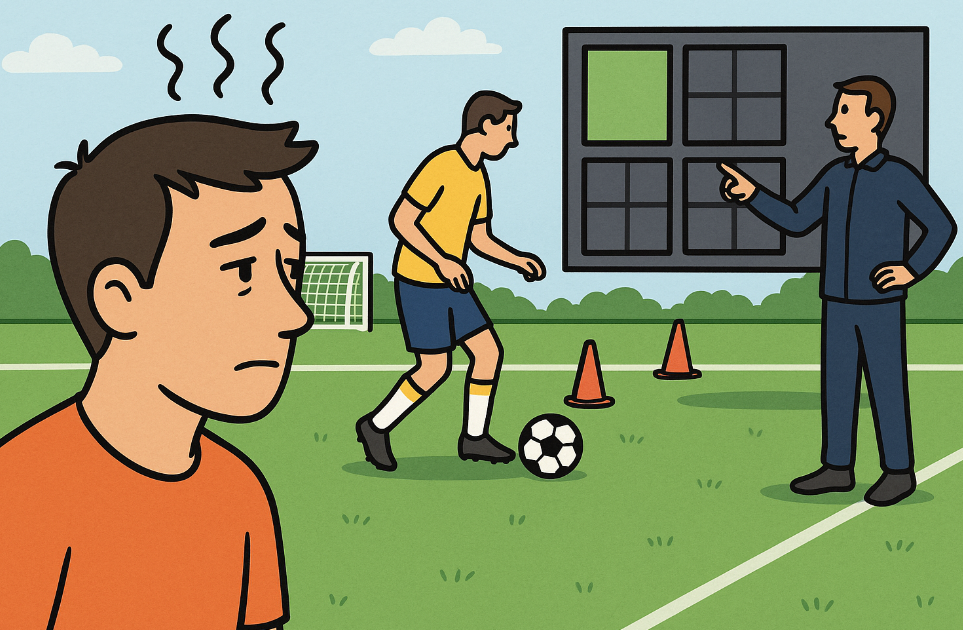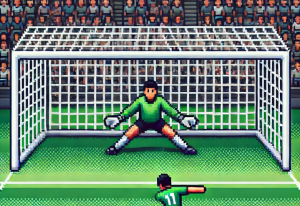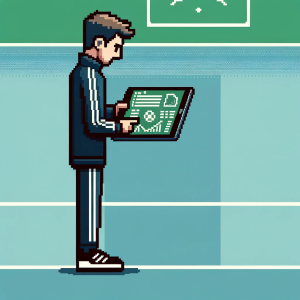
Beating Mental Fatigue in Soccer
How many times have you watched your players make sloppy passes late in a match and thought, “They’re not tired in their legs—so what’s going on in their heads?”
Welcome to the world of mental fatigue—the hidden opponent that affects attention, decision-making, and execution on the pitch. A recent study from Germany tested this head-on using the Footbonaut, a high-tech soccer training tool, to explore how mental fatigue affects performance in a realistic soccer scenario.
The findings? Mental fatigue is real, but how we test and train it matters. And that’s where coaches, players, and clubs can learn a lot.
What the Research Did
Researchers had 24 competitive soccer players complete a mentally demanding version of the Footbonaut task, essentially a rapid-fire passing challenge where targets changed unpredictably, forcing them to make constant decisions.
Then, players were tested on three fronts:
- Task-specific: The Footbonaut again (to see if performance dropped).
- Near-transfer: The Loughborough Soccer Passing Test (LSPT), a drill combining speed, accuracy, and decision-making.
- Far-transfer: A Stroop test, a computer-based measure of general cognitive focus.
The question was: Would mental fatigue from a soccer-specific drill spill over into these other performance areas?
Surprisingly, results showed no major declines in accuracy or response times. Players did report feeling more tired and less motivated, but their on-field execution didn’t significantly suffer.
What This Means for Soccer
At first glance, this might seem like good news—maybe mental fatigue doesn’t hurt performance as much as we think. But the bigger takeaway is this: how we create and measure fatigue matters.
Traditional lab tests (like staring at colored words on a computer) don’t capture the intensity of a match. The Footbonaut and LSPT bring us closer, but even they may not be challenging enough to mimic the 90-minute grind of a real game.
For coaches, this highlights two things:
- Mental fatigue is tricky—it doesn’t always show up in obvious ways.
- Engaging, soccer-specific drills may mask fatigue by keeping players motivated.
4 Coaching Takeaways You Can Use Today
- Train the Mind Like the Body: Just as you vary physical drills, build mental load into practice. Use decision-heavy drills where rules change mid-play, forcing players to adapt quickly.
- Watch for Subtle Signs: Players might not “look” tired but can still feel drained. Notice dips in motivation, focus, or communication as cues of mental fatigue.
- Limit Mental Load Before Matches: Pre-match team talks, video sessions, or tactical walk-throughs are useful—but overloading players mentally can backfire. Keep these sharp and focused, especially before big games.
- Design Recovery for the Brain Too: Recovery isn’t just ice baths. Downtime, relaxation, and even structured mindfulness can help players reset both mentally and physically.
Connecting to Bigger Trends
This research connects to broader changes in soccer:
- Player safety: Just like managing concussions, managing mental fatigue can prevent costly errors.
- Youth development: Young players face school stress alongside training—mental load matters at all levels.
- Analytics: Clubs increasingly use GPS and heart-rate data; adding “cognitive load” measures is the next frontier.
For clubs that want an edge, building smarter training that considers both physical and mental aspects is a game-changer.
Your Turn to Kick It Off
Mental fatigue may not always slow your players’ feet, but it can cloud their decisions—the difference between a clean through ball and a turnover.
So here’s the challenge:
- How do you currently recognize mental fatigue in your players?
- What drills or routines do you use to train both mind and body?
- If you had to cut one mentally draining activity before match day, what would it be?
Drop your thoughts in the comments, share with your team, and let’s start treating mental training with the same seriousness as physical prep.



